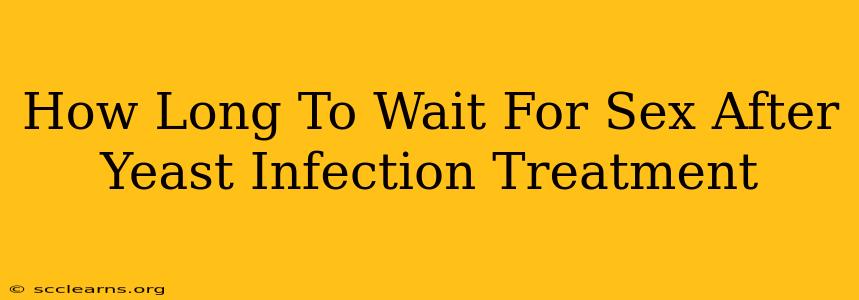A yeast infection, also known as candidiasis, is a common fungal infection that can affect the vagina. While uncomfortable and inconvenient, it's usually treatable. But after treatment, a crucial question arises: how long should you wait before resuming sexual activity? Let's delve into the details.
Understanding Yeast Infection Treatment
Treatment typically involves antifungal medications, either topical creams, ointments, or oral medications. These medications target the Candida fungus, responsible for the infection. The key is to complete the entire course of treatment as prescribed by your doctor, even if symptoms improve before finishing. Stopping early can lead to recurrence.
Common Symptoms of Yeast Infection
Before discussing the waiting period, let's quickly review common symptoms, which can help you recognize the infection and seek appropriate treatment:
- Vaginal itching: This is often the most prominent symptom.
- Vaginal burning: A burning sensation during urination or sexual intercourse.
- Thick, white discharge: The discharge might resemble cottage cheese.
- Redness and swelling: Of the vulva (the outer lips of the vagina).
- Pain during intercourse (dyspareunia): Sex can be painful when you have a yeast infection.
When Is It Safe to Have Sex After Treatment?
The general recommendation is to wait until your symptoms have completely cleared up and you feel comfortable. This usually means waiting at least 24-48 hours after finishing your prescribed medication. However, this is a general guideline.
Factors to Consider:
- Severity of the infection: A severe infection may require a longer waiting period for complete healing.
- Type of treatment: Oral medications might require a slightly longer wait than topical treatments.
- Individual healing: Every body heals at a different pace. If you are experiencing any lingering discomfort or have concerns, consult your doctor.
Don't rush it. Premature sexual activity while still experiencing symptoms can re-introduce the fungus, prolong the infection, and potentially spread it to your partner. Your comfort and complete recovery should be the priority.
Preventing Yeast Infection Recurrence
Once you're fully healed, consider these preventative measures to minimize the risk of future infections:
- Maintain good hygiene: Gently cleanse the vaginal area with mild soap and water, avoiding harsh chemicals or douches.
- Wear breathable underwear: Cotton underwear is preferable to synthetic fabrics that trap moisture.
- Avoid tight-fitting clothing: This prevents excessive moisture buildup.
- Practice safe sex: Using condoms can help prevent the spread of yeast infections. If your partner develops symptoms, they too should seek treatment.
- Manage blood sugar levels: Uncontrolled diabetes can increase the risk of yeast infections.
When to Consult a Doctor
If you experience persistent symptoms, recurring infections, or severe discomfort, always consult your doctor or gynecologist. They can provide a proper diagnosis, recommend appropriate treatment, and address any underlying health concerns contributing to the infections. They can also offer advice tailored to your individual situation.
Disclaimer: This information is for educational purposes only and does not constitute medical advice. Always consult a healthcare professional for diagnosis and treatment of any medical condition.

